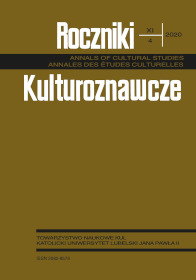The Idea of New Middle Ages in the Light of Friedrich Nietzsche’s Nihilism
The Idea of New Middle Ages in the Light of Friedrich Nietzsche’s Nihilism
Author(s): Piotr PasterczykSubject(s): History, Philosophy, History of Philosophy, Middle Ages, 19th Century Philosophy, 6th to 12th Centuries
Published by: Towarzystwo Naukowe KUL & Katolicki Uniwersytet Lubelski Jana Pawła II
Keywords: Nietzsche; nihilism; Christianity; values; death of God; man
Summary/Abstract: The author of the article proposes the concept of the New Middle Ages and describes the modern and postmodern transformation taking place in Western culture, which is similar to the medieval period’s transition from the Greek-Roman world to the Christian world. With the help of the New Middle Ages concept, the transition from the Christian world to a presently unknown world of new values corresponding to the paradigms of science and technology can be defined. Such a transition is expressed by Friedrich Nietzsche’s idea of nihilism. It contains the postulate about a new man and a postulate about new values in response to the phenomenon of God’s death in the modern and post-modern world. Nietzsche’s nihilism is closely related to the fundamental changes taking place in Western culture. It not only includes negating the values that are the basis of the Christian world, but also the necessity to found new values based on the awareness of the absence of God who guarantees these Christian values. Nietzsche’s nihilism is also a critical reference to those attitudes, ones that do not notice such change of values at all or denies it altogether.
Journal: Roczniki Kulturoznawcze
- Issue Year: 11/2020
- Issue No: 4
- Page Range: 151-176
- Page Count: 26
- Language: English

